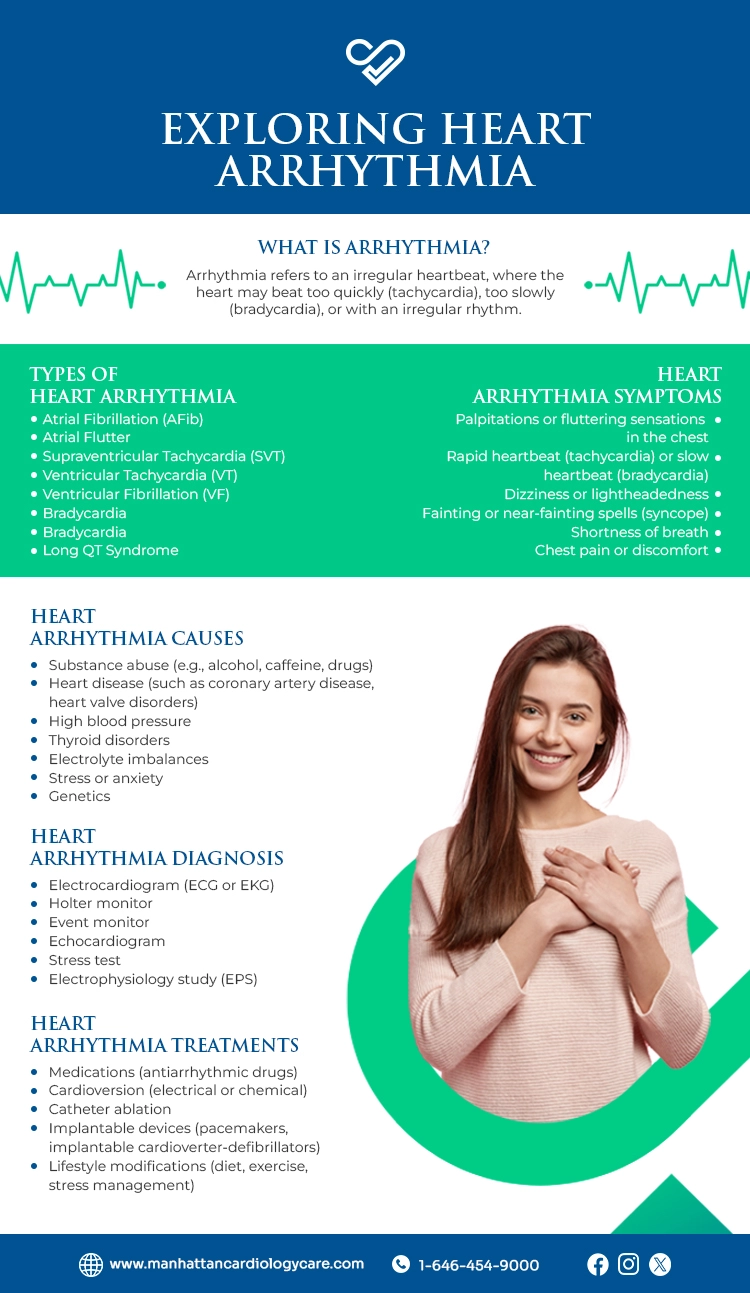Do you remember a fluttering heart, skipping a beat, or your heart racing unexpectedly? Heart Disease by Race These sensations, known as heart palpitations, can be an unsettling experience. While they are often harmless and caused by factors like stress or caffeine, they can also be a sign of an underlying heart condition. If you experience persistent or concerning heart palpitations, it’s essential to consult a medical professional for a proper evaluation and diagnosis. Perhaps during a moment of excitement or even at rest? – What if these sensations weren’t just fleeting moments but signs of a deeper issue?
Welcome to the rhythms of the heart, where the steady beat can sometimes get into an irregular heartbeat pattern, leading to a condition known as arrhythmia.
Table of contents
What is Arrhythmia?
Arrhythmia refers to an irregular heartbeat, where the heart may beat too quickly (tachycardia), too slowly (bradycardia), or with an irregular rhythm.
Normally, the heart contracts and relaxes in a coordinated rhythm to pump blood throughout the body. However, in arrhythmia, this rhythm is disrupted, potentially leading to complications related to irregular heartbeat.
How Serious is a Heart Arrhythmia?
The seriousness of arrhythmia varies depending on factors such as the type of arrhythmia, underlying health conditions, and individual health status. While some arrhythmias may be harmless, others can be life-threatening and increase the risk of stroke, heart failure, or sudden cardiac arrest.
Types of Heart Arrhythmia
There are several types of heart arrhythmia, including:
- Atrial Fibrillation (AFib)
- Atrial Flutter
- Supraventricular Tachycardia (SVT)
- Ventricular Tachycardia (VT)
- Ventricular Fibrillation (VF)
- Bradycardia
- Sick Sinus Syndrome
- Long QT Syndrome
Each type of heart arrhythmia presents with its own set of characteristics and potential complications.
How Common is Heart Arrhythmia?
Heart arrhythmia is a relatively common condition, affecting millions of people worldwide. The prevalence increases with age and is often associated with underlying heart disease or other health conditions.
Heart Arrhythmia Symptoms
Heart arrhythmia symptoms of can vary depending on the type and severity but may include:
- Palpitations or fluttering sensations in the chest
- Rapid heartbeat (tachycardia) or slow heartbeat (bradycardia)
- Dizziness or lightheadedness
- Fainting or near-fainting spells (syncope)
- Shortness of breath
- Chest pain or discomfort
It’s essential to note that some individuals may not experience any heart arrhythmia symptoms despite having irregular heartbeat, making regular check-ups and screenings crucial for early detection.
Heart Arrhythmia Causes
There are several heart arrhythmia causes that are inclusive of:
- Heart disease (such as coronary artery disease, heart valve disorders)
- High blood pressure
- Thyroid disorders
- Electrolyte imbalances
- Substance abuse (e.g., alcohol, caffeine, drugs)
- Stress or anxiety
- Genetics
Identifying and addressing underlying heart arrhythmia causes is essential in managing irregular heartbeat effectively.
Heart Arrhythmia Diagnosis
Heart arrhythmia diagnosis typically involves a combination of medical history review, physical examination, and diagnostic tests, including:
- Electrocardiogram (ECG or EKG)
- Holter monitor
- Event monitor
- Echocardiogram
- Stress test
- Electrophysiology study (EPS)
These tests help healthcare providers with heart arrhythmia diagnosis, by assessing the heart’s electrical activity and identify any abnormalities in rhythm.
Heart Arrhythmia Treatments
Heart arrhythmia treatment options depend on the type, severity, and underlying causes but may include:
- Medications (antiarrhythmic drugs)
- Cardioversion (electrical or chemical)
- Catheter ablation
- Implantable devices (pacemakers, implantable cardioverter-defibrillators)
- Lifestyle modifications (diet, exercise, stress management)
Individualized heart arrhythmia treatment plans are tailored to each patient’s unique needs and health status.
Conclusion
At Manhattan Cardiology Care, we know that when your heart’s rhythm goes off track, it can cause health problems. But don’t worry, we’re here to help.
Our team will work closely with you to understand your unique situation and create a treatment plan just for you. Don’t let heart arrhythmia control your life.
Schedule an appointment with us today and start your journey to a healthier heart.
– Disclaimer –
This blog is for informational & educational purposes only, and does not intend to substitute any professional medical advice or consultation. For any health related concerns, please consult with your physician, or call 911.


